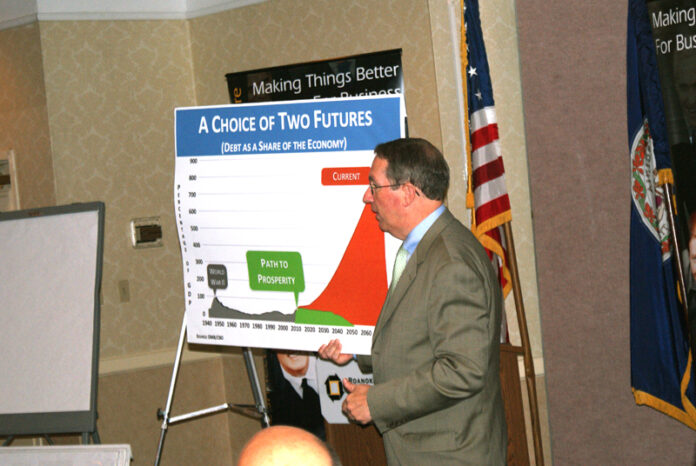
by Gene Marrano
Cut the marginal tax rate for U.S. Corporations, encourage job-producing domestic energy production and rein in the federal debt. That was the message from 6th District Congressman Bob Goodlatte (R-Roanoke) to a Roanoke Regional Chamber of Commerce breakfast on Tuesday. As he is wont to do, Goodlatte once again broke out a series of charts that showed how the deficit is choking the economy, according to the ten-term lawmaker.
Among the 50,000 or so communiqués received every year from constituents, 7000 are asking for help in cutting through federal red tape, Goodlatte told the Chamber audience at the Holiday Inn-Tanglewood. Then there is the issue of raising the debt ceiling – a matter, said Goodlatte, that Congress had handled “very routinely” until recently. The new D-Day has been set for August 2nd, he noted. If a decision has not been made by then, it could start affecting the country credit-wise, domestically and internationally.
The U.S. budget would have to be balanced within one year in order to avoid raising that ceiling – something that Goodlatte said would not happen realistically. More than half of all Americans recently polled do not want to see that limit increased, he noted. “A major task,” conceded Goodlatte. Forty two cents of every dollar the government now borrows goes to pay down debt.
Goodlatte said he would not take anything off the table when it comes to budget cuts, even defense spending, but entitlement programs like Medicare and Social Security offer the greatest chance for reform. Fellow Republicans are not off the hook either – the Bush administration was “rightly criticized” for the growth of government before Barack Obama became president.
“We have to cut spending and we cannot default on our obligations,” said Goodlatte, who backed the House budget passed a month ago that “was not without controversy.” The Senate has not voted on the proposal. That budget would balance government spending versus revenues by 2050. In contrast, an Obama administration budget plan “never, ever balances.”
Goodlatte backs “means testing” for Medicare recipients, saying the wealthiest people may not receive any benefits, and supports Medicaid block grants sent to the states, which he said would encourage more efficiencies in the program. An abundance of “waste, fraud and abuse” in the Medicare program must be addressed. Nationwide, $519 billion was spent on Medicare last year.
Social Security could be fixed with “small tweaks,” said Goodlatte, who is also leery of Obama administration and Federal Reserve Bank trends that have traded in long-term debt for short-term debt with lower interest rates. That only works if rates stay low but if they go up, as some predict, that could mean notes, coming due sooner, that the government – and taxpayers – cannot afford to pay off.
“There’s something wrong,” said Goodlatte. How to keep jobs here? Lower the marginal corporate tax rate from 35%, perhaps to 25%, so that American companies are encouraged to spend their money on production and expansion domestically, instead of in countries with much lower rates. The U.S. now has the highest corporate tax structure in the world, according to Goodlatte.
An energy program that encourages production would also create jobs; Goodlatte said tax incentives are now skewed too strongly towards alternatives like wind and solar, which are expensive to produce and provide relatively little energy. He also supported a Senate bill that would kill ethanol subsidies, for plant-based additives used in gasoline production. Learning from “a disaster” like the BP Gulf oil spill is prudent, but it should not signal the end of domestic oil production added Goodlatte.
The “juggernaut of the EPA” must be curtailed, with the Environmental Protection Agency now imposing standards that go too far to protect the environment at the expense of economic growth.
Goodlatte also said there was a role for the federal government when it comes to funding transportation projects, including a reformulation of an “outdated” gasoline tax that has not kept pace revenue-wise. He said states must have their own plans for raising transportation project money and praised Virginia Governor Bob McDonnell for some of his proposals.
A fiscal conservative, Goodlatte has long been warning about the debt issue and overspending by the federal government. He said the United States does not want to become Greece, which “begged the rest of Europe” last summer to help stave off default.
U.S. debt now matches overall GDP. “At what point does the United States become Greece?” asked Goodlatte. Raising taxes isn’t the answer – he called it a spending problem, not a revenue issue. “The top fifty percent of all American families,” said Goodlatte, “now pay 97% of all federal income taxes.”

